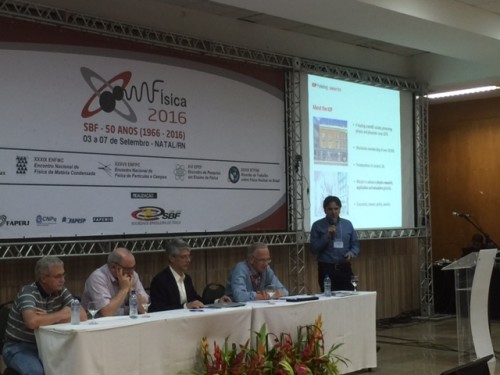
All-male line-up: Matin Durrani speaking at a round-table on the future of physics at the 50th-anniversary meeting of the Brazil Physics Society.
By Matin Durrani in Natal, Brazil
I rounded off my final full day at the 50th-anniversary meeting of the Brazil Physics Society (SBF) by taking part in a round-table on the development of physics over the next two decades organized by former SBF president Ricardo Galvão,
Alongside me (right to left in the photo above) were Christophe Rossel from IBM’s Zurich lab, who’s current president of the European Physical Society, Roger Falcone from the University of California, Berkeley who’s vice-president of the American Physical Society and will take over as head honcho in 2018, as well as Carlos Pinto de Melo from the Universidade Federal de Pernambuco, who was SBF president from 2009 to 2011. A late entry to the panel was Valentin Areviev from the Joint Institute for Nuclear Research in Dubna, Russia.
I took the opportunity to look at some of the big questions in physics, the potential most significant spin-offs from physics research, as well as changes in the way physics is carried out, based in part on some of themes tackled in Physics World‘s 25th anniversary issue.
Physicists, I argued, will need to improve how they communicate, especially through video, do more to involve the public, particularly through citizen-science initiatives, and increase their co-operation with researchers from other countries, especially in emerging nations. Physics will also have to become more interdisciplinary and more diverse.
As you may remember, Physics World published a special issue on diversity back in March and one theme I tackled was “unconscious bias” – the idea that we all have in-built biases based on how we’ve been brought up, where we studied, where we grew up and so on. Those biases basically mean we prefer the company of people who look and sound like ourselves. That’s fine socially, but if we reach positions of power, we as physicists can end up making decisions – hiring staff, sitting on funding panels or promoting people, for example – that are irrational, unfair and possibly even illegal
One other consequence of unconscious bias that I touched on is that people organizing conferences, who are often men, inadvertently pick people who are just like them. That can lead to situations where all invited speakers or every member of a panel debate is a man, not reflecting the gender ratio of the relevant community. There’s even a “Conference Diversity Distribution Calculator“, which tells you how many women you’d expect to find in a random selection of x people assuming they make up y% of available speakers.
As you can see from the picture above, I myself just took part in an all-male panel. If we conservatively assume women make up about 15% of all physicists then there’s a 44% chance of a five-strong panel being male if they’ve been picked at random
So it’s not surprising really that my panel was all male and I’m not criticizing the organizers, but were there really no women who could have spoken? Perhaps some were asked and couldn’t attend for whatever reason. All I’m saying is that if you’re organizing a conference, just take a moment to think beyond the “obvious” candidates when inviting people to speak – especially if it’s a debate about the changing face of physics.
• For more on diversity, listen to this recent Physics World podcast on the subject.
Guidelines
Show/hide formatting guidelines
this text was deletedwhere people live in harmony with nature and animals</q>
Some text